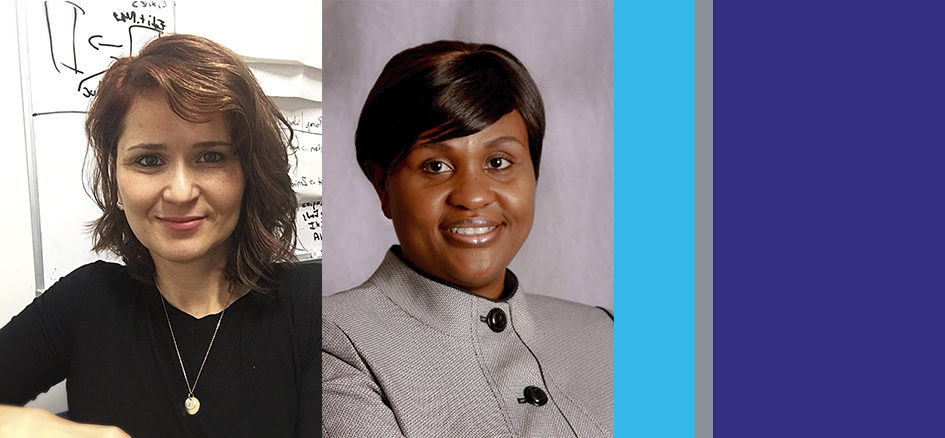Q&A: How Professional Certification Supports Community Health Workers

We were thrilled to speak with two senior Massachusetts CHWs, who weighed in on the impact of professional standards, changing employer dynamics, the role of empathy and commitment to social justice:
- Erica Guimaraes, Program Coordinator, Office of Community Health Workers, Division of Prevention and Wellness, MA Department of Public Health
- Ruby Cherfils, Executive Director, Multi-Boards, Bureau of Health Professions Licensure, MA Department of Public Health
Community Health Workers (CHWs) in Massachusetts got a boost last year when the state launched its first-ever voluntary CHW certification program, creating standards and guidelines for this critical public health workforce. Community Health Worker is an umbrella term for a number of different job titles. In Massachusetts, they are defined as “public health workers who apply their unique understanding of the experience, language and/or culture of the populations they serve in order to carry out their roles, which includes:
- Applying culturally appropriate health education and information
- Bridging and/or culturally mediating between individuals, communities and health and human services
- Assisting people to access the services they need, and
- Advocating for individual and community needs.”
In important ways, Erica Guimaraes’ career path parallels the growing importance of CHWs within the U.S. health system. Born in Brazil, Erica came to the U.S. at 17, and immediately became her family’s guide through the often inscrutable healthcare landscape. Soon, she began volunteering in East Boston’s Brazilian community, leading groups for women and young people, which she did for fifteen years. Erica got her first paying job as a CHW, connecting new immigrants to social services, and later, making home visits to help kids with asthma. She continued through the ranks: working at a hospital, then as a CHW supervisor, managing CHW programs and overseeing CHW teams on research projects. Now, Erica supports CHW-related programming at the Massachusetts DPH, providing technical and design assistance to CHW employers, among other responsibilities.
Here, in an edited and condensed interview with Erica and her colleague Ruby Cherfils, on key components of the job, what employers need to know about the profession and how empathy is the heart of the work.
Health Leads: What’s the central role of a CHW and what barriers remain, especially for those working in health systems?
Erica: CHWs are hired primarily because of their close understanding of the populations they serve. Their lived experience allows them to be able to empathize with community members in a unique way. In many cases, they’ve been through similar issues, crises and barriers in care. They’ve experienced it themselves, and because of that they’re able to walk alongside others to help them overcome those barriers. CHWs work in diverse settings, including social service and healthcare organizations. I think CHWs, particularly those who work in clinical settings, often face the puzzling task of trying to help patients navigate fragmented systems. Often times, patients feel like they are not cared for as a whole person and as though systems aren’t designed to treat everyone equally. We see firsthand every single day in this profession just how disjointed systems can feel to patients.
HL: How do CHWs help patients navigate and make connections in our fragmented healthcare and social services systems?
Erica: Sometimes when we are accompanying patients at appointments, it feels to the patient as though their liver, or their lungs or heart, are treated as separate from the whole person, who might be experiencing complex social needs and circumstances. CHWs play that role of bridging systems and connecting the dots, helping to provide details and information that might be critical for an effective plan of care. We know how communities of color experience higher rates of chronic conditions, and other health issues. There’s plenty evidence of that problem. Social justice and racial justice work are recognized as central values of CHW professionals; as a diverse workforce they are uniquely positioned — with appropriate resources and support – to help address those issues.
Ruby: The one keyword I always use is “bridge.” CHWs are those critical people within the healthcare system that truly bridge the gap between the patient, or the client, and the access to the system, and how to navigate the complex healthcare system. It’s very different from other clinical roles in that CHWs are primarily recruited and hired because they are a reflection of the communities and the populations they serve. I always use a story about my mom who was diagnosed with Parkinson’s. She typically makes teas at home from herbs that she received from family members back home. Through a conversation with a CHW, she was stated that she didn’t feel her medications were working. She brought up the teas, and [the CHW] was like, “Well, would you mind if I get a couple of leaves and we bring them to the next doctor’s appointment?” It turned out that the chemical makeup of the leaves and the drugs that she was being prescribed were in conflict with each other. Most clinicians who typically see patients just when they come in, miss that level of [that] information.
HL: What specifics should employers know about recruiting, hiring and working with CHWs?
Erica: It is very important for employers to have an understanding of the professional identity of CHWs, the core values, training needs, and scope of their work. For example, there are 10 core competencies established by the Board of Certification of CHWs, which serve as a roadmap for employers to understand the types of responsibilities CHWs can have and how to engage them. This understanding of the nature of the CHW profession needs to be the foundation upon which CHWs are engaged by employers. It helps inform how programs are designed and implemented. The intent here is to promote the CHW professional identity– the core values of the profession — here in Massachusetts.
Also, certification is an important milestone for strengthening the profession. Certification has been and will continue to be very important in helping employers and other professionals who work alongside CHWs as part of teams and employers understand the work, the training needs, the difference of titles and how they fit in underneath our professional umbrella.
We know that there is unfortunately still a high rate of turnover in this field, which could be tied to issues such as lack of proper supervision, burnout, lack of opportunities for professional development, and salaries that are still not reflective of the value of the outcomes their work can help to achieve – including improved patient health outcomes, reduced healthcare-related costs, reduced health inequities and improved patient satisfaction. It’s important for employers to learn how to evaluate the impact of CHW interventions. Many employers are still struggling with that. If you can’t evaluate the outcomes, you don’t have the information you need to demonstrate the value of the work, and sustain it.
HL: What are ways to further support the profession?
Erica: CHWs are part of a very diverse workforce — that is why they’re hired, because of their understanding of the communities they serve. It’s important to understand the social justice nature of this work because when the workforce is supported with training, supervision, career development opportunities, caseload support, pay, absolutely — these jobs are generally underpaid — and an understanding of the diversity here, the CHWs will be better prepared to support the diverse community they serve. All of this can help address turnover rates, which are high.
On social justice, as I said, CHWs traditionally serve in communities of color, who face health inequity and injustice. When CHWs have the professional support they need, they, in turn, have greater opportunities to do the necessary social and racial justice work they are equipped to do.
Ruby: An individual might come to you and present with a physical illness, but there could be some other underlying issues that you may not be aware of. If [the individual] was assessed and screened in the right way, it might help you identify what those things are. So, for employers, I definitely see a lot of support to pay, leverage, and sponsor CHW trainings. I think you’ll probably also see, as the profession continues to grow and get more visibility, and people have a better understanding of the scope and the role, I think it will definitely start the conversations on impact with insurer groups, and whether or not they start paying for the services of the CHW workers.
HL: How does empathy fit into the job description?
Erica: There’s this story: a CHW named Pep, who is also a part-time interpreter, was working at the health center, and I was his supervisor. Someone came to the emergency room, and Pep was the interpreter assigned. After the encounter, he came to me and said he’d met this patient who was an immigrant and not connected to primary care. His care was the emergency room. He had leukemia. He was not taking medication and he had some other health conditions. He came to me with his empathetic heart and said: ‘I know my caseload is kind of full, but I think this patient needs help, and I’m just wondering if you think my case load is too full to add this person? I could help him during my lunch break?’ I still cry when I think of this case. I think the compassion demonstrated by Pep that day is an example of how empathy drives CHW professionals to support and advocate for community members every day. We figured out the caseload issue, and Pep and was able to work with the patient for several months to connect him to primary care, provide navigation to several critical specialty care appointments, and provide support with accessing and managing medications. It all started with empathy.
To determine the broader impacts of certification on the CHW workforce, the Massachusetts Department of Public Health (DPH) is rolling out a multiyear CHW Workforce Surveillance survey. For more information about the survey, reach out to the Office of Community Health Workers at CHWinfo@state.ma.us.
Comments have been edited for clarity.




